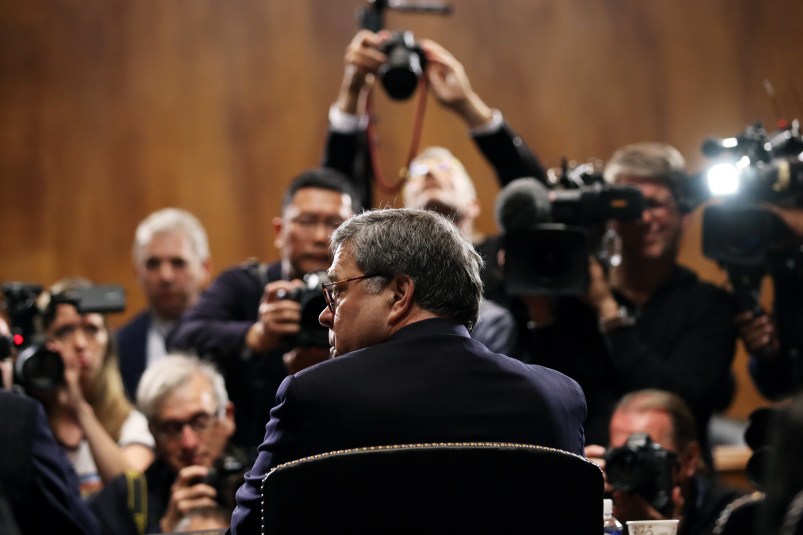GOP senators on Wednesday gave Attorney General Bill Barr an opening to pivot from his misleading handling of the release of the Mueller report to another direction: alleged FBI spying on the Trump campaign.
Barr jumped at the opportunity, chiming in to lawmakers that he has Justice Department attorneys “helping me review the activities over the summer of 2016.”
Within 10 minutes of the hearing coming to order, Senate Judiciary Committee chair Sen. Lindsey Graham (R-SC) was deep in the weeds dissecting Hillary Clinton’s use of a private email server.
Graham also did a dramatic reading of texts between two high-level FBI officials during the 2016 election, cherrypicking the most damaging examples — even sharing, unfiltered, one exchange in which Trump was called “a fucking idiot.”
In his questioning, Graham asked Barr a series of yes/no questions having to do with investigating the investigators. Graham asked if Barr “shared my concerns with the FISA warrant process” and “that the lack of professionalism in the Clinton email investigation is something we should all look at?”
“Yes,” Barr flatly replied.
Sen. Chuck Grassley (R-IA) asked Barr if Congress would receive a report regarding alleged FBI spying, to which the attorney general replied: “I envision some kind of reporting at the end of this.”
Grassley also broached the topic of the Steele dossier, commissioned by opposition research firm Fusion GPS. For Grassley, the dossier appears to be a route to accuse Democrats of participating in the Russian interference campaign.
“The Steele dossier was central to the now-debunked collusion narrative,” Grassley said. “For a full accounting, shouldn’t the special counsel have considered on whether the Steele dossier was part of the Russian disinformation and interference campaign?”
“Special counsel Mueller has put out his report, and I have not yet had anyone through the full scope of the investigation,” Barr replied. “I am trying to assemble all the existing information out there about it.”
Sen. John Cornyn (R-TX) moved the discussion towards allegations that President Obama was incompetent in preventing Russian interference in the 2016 election.
Cornyn did not mention Senate Majority Leader Mitch McConnell (R-KY)’s role in the issue, where he told Obama in October 2016 that he would refuse to sign on to a joint statement about the interference and treat it as a political attack.
Cornyn asked Barr “why didn’t the Obama administration do more” to probe the Russian campaign.
Barr went on to cite the Mueller report’s description of Russian interference efforts, and then said: “I was thinking to myself, if that had been done starting in 2016, we would be much further along.”
Cornyn then asked “how do we know that the Steele dossier itself…is not Russian disinformation?”
“I can’t state that with confidence,” Barr replied. “And that is one of the areas that I’m reviewing.”
Sen. Josh Hawley went on a rant about the alleged FBI spying in an attempt to cast the Mueller probe as an effort to “overturn a democratic election.”
He attributed the origins of the probe to “an unelected bureaucrat, an unelected official in this government, who clearly has open disdain, if not outright hatred for Trump supporters.”
Senate Republicans had signaled in advance that they intended to question Barr about how the Mueller probe came about.
The GOP has sporadically pursued a strategy in which it tried to “investigate the investigators” with varying levels of success since Mueller’s appointment in May 2017.
Much of that has focused on FBI officials Lisa Page and Peter Strzok, with GOP senators attempting to portray text exchanges between the two former lovers as evidence of a conspiracy against Trump. The pair had sent messages to each other during the 2016 campaign that were critical of Trump, while also expressing doubt about allegations of collusion with Russia.
Other allegations revolve around the supposed role of the Steele dossier in the investigation’s early stages.
Barr himself suggested during testimony before Congress last month that “spying did occur” on the Trump campaign, before walking the statement back while under intense public criticism.
In the Mueller report, the special counsel provides an accounting of how his probe began. In the second volume, Mueller details how his appointment came after months of turmoil around former National Security Adviser Michael Flynn and the firing of former FBI director Jim Comey.
“When Sessions told the President that a Special Counsel had been appointed, the President slumped back in his chair and said, “Oh my God. This is terrible. This is the end of my Presidency. I‘m fucked,” the report reads.







The conspiracy to obstruct? Go for it…
Buttery males!
Buttery males!
Buttery males!
Why’s anyone surprised? The GOP is always going to protect the President, regardless of the cost.
I wrote earlier and I write again here: These guys are writing the script of their place in history today. It won’t be pretty. Every last one of them will go down ignominiously as traitors that were happier destroying the nation than protecting it. So much for their oath of office.
What is it going to take to break this bullshit bubble the GOP operates in? They are shameless in their treachery.
“Clinton and the Democratic Party were the ones who actually colluded with the Russians”
Coming to an election near you next October.